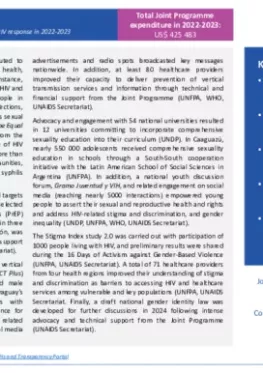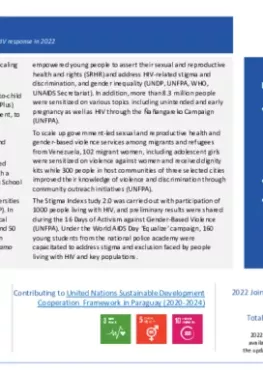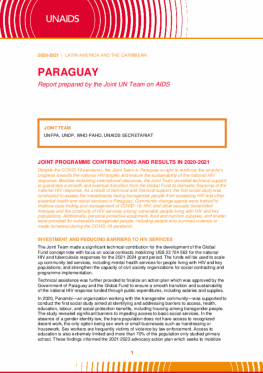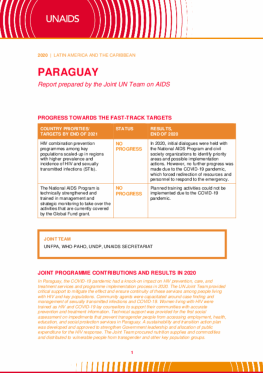|
Paraguay
In 2022-2023, the Joint Programme support contributed to further scale up access to HIV, sexual and reproductive health, and gender-based violence education and services. For instance, over 5400 people from the military force accessed rapid HIV and syphilis testing services in 2023, and over 9800 people in uniforms were sensitized on HIV, sexually transmitted infections, sexual and reproductive health, discrimination, as well as sexual and gender-based violence (UNFPA). As part of the Let’s be Equal communication campaign, 160 young male students from the national police academy also improved their knowledge of HIV and syphilis prevention (UNAIDS Secretariat). Besides, more than 10 800 condoms were distributed to communities, predominantly young men to prevent new HIV and syphilis infections (UNFPA).
A pilot HIV self-testing programme incorporating national targets and indicators was developed for implementation in selected regions; and a new national pre-exposure prophylaxis (PrEP) strategy, encompassing evidence from pilot projects led in three government- and community-led service sites in Asunción, was approved and is implemented, thanks to the technical support from the Joint Programme (UNFPA, WHO, UNAIDS Secretariat).
A communication campaign on the elimination of vertical transmission of HIV, hepatitis, syphilis and chagas (EMTCT Plus) promoted innovative approaches, including increased male engagement in healthcare facilities to accelerate Paraguay’s progress towards elimination. Thus, 2000 posters with promotional messages and 1000 flipcharts with guidance for diagnosis and treatment of the three diseases and related audiovisual materials were used in health facilities; social media advertisements and radio spots broadcasted key messages nationwide. In addition, at least 80 healthcare providers improved their capacity to deliver prevention of vertical transmission services and information through technical and financial support from the Joint Programme (UNFPA, WHO, UNAIDS Secretariat).
Advocacy and engagement with 54 national universities resulted in 12 universities committing to incorporate comprehensive sexuality education into their curriculum (UNDP). In Caaguazú, nearly 550 000 adolescents received comprehensive sexuality education in schools through a South-South cooperation initiative with the Latin American School of Social Sciences in Argentina (UNFPA). In addition, a national youth discussion forum, Gramo Juventud y VIH, and related engagement on social media (reaching nearly 5000 interactions) empowered young people to assert their sexual and reproductive health and rights and address HIV-related stigma and discrimination, and gender inequality (UNDP, UNFPA, WHO, UNAIDS Secretariat).
The Stigma Index study 2.0 was carried out with participation of 1000 people living with HIV, and preliminary results were shared during the 16 Days of Activism against Gender-Based Violence (UNFPA, UNAIDS Secretariat). A total of 71 healthcare providers from four health regions improved their understanding of stigma and discrimination as barriers to accessing HIV and healthcare services among vulnerable and key populations (UNFPA, UNAIDS Secretariat. Finally, a draft national gender identity law was developed for further discussions in 2024 following intense advocacy and technical support from the Joint Programme (UNAIDS Secretariat).





